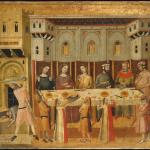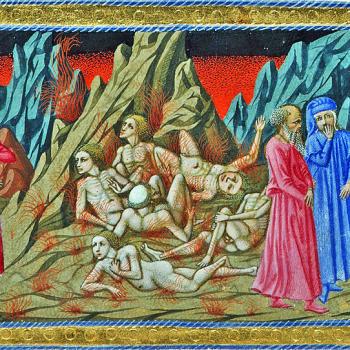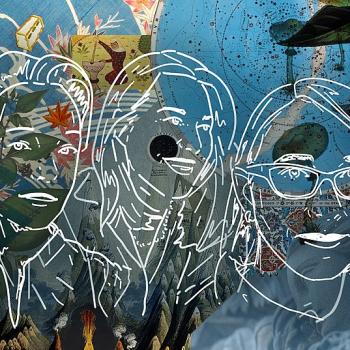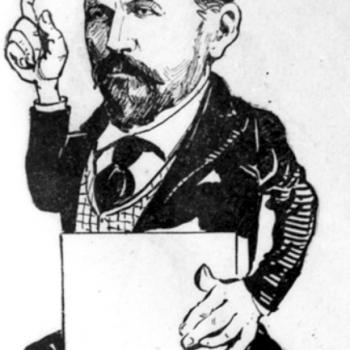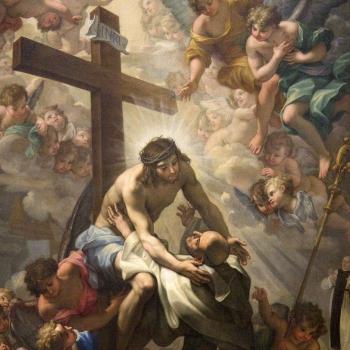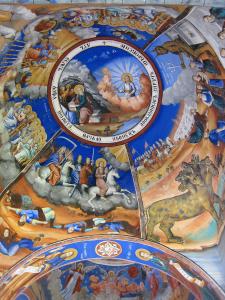
The Apocalypse, that is, the Book of Revelation, presents to us the truth about history, not because it gives us a history of the world, but rather, through it we are given a glimpse of the metaphysical truths which lie behind every moment of history. While history is in progress, there will be a struggle by the good against all the darkness and evil which would try to snuff it out. The good thrives, the good perseveres, though not without pain or sorrow, not without challenges, indeed, often not without many times evil appears to be victorious over the good. And yet, behind it all, we find that God still reigns, and it is in and through the reign of God, which is eternal, we see any victory of evil is ephemeral. In eternity, good reigns supreme, and therefore, in and through every moment, we have the means to tap into the eternal reign of God and be consoled by the good which comes from and is found in it. This is why, despite all the terrors which we find in it, the Apocalypse is a book of hope, for it points out that despite whatever evil we have to face, that evil can be overcome because it has been and will always be overcome in eternal the kingdom of God.
History is real. What takes place in history will never be lost, for time finds itself within the domain of eternity. What happens in history will have eternal significance, because time is penetrated by the eternity in which it resides. Nonetheless, history is also temporal, and our normal experience of history is through that temporality (and not the way that temporality is connected to eternity). [1] Time marches on. What is achieved by one generation is overtaken by the next. In every generation, people will have to face challenges of their own, and how they deal with those challenges will determine what they make of themselves for eternity even as they will set the conditions from which subsequent generations emerge. Thus, every generation will be formed within its own context, with the various hard-earned goods of previous generations given unto them, even as they will experience the consequences of the sins of the past. From that background, every generation will have their own unique challenges to face, their own evils which they will have to fight against, their own goods which they can and should develop. Inasmuch as a generation gives in to some sort of evil, that evil will corrupt or destroy some of the goods which had been handed to it, so that the next generation will experience the consequences of such evil. We must always work hard to sustain the goods of the past, to preserve them in their integrity, but because it is hard work, because it is often inconvenient, we do not do so, and so through our own sloth, evil rises up and takes away much of those things we have taken for granted. No matter where we are at, we always have some good which we can fight for, and yet, our worst instincts lead us astray so that, as Florensky wrote, while in a Gulag, humanity had a way of destroying the world around itself, trashing it out of indifference if not from spite. Thus prisoners, such as himself, should have tried to make their lives better by working to preserve what little good they had been given, but instead, he saw how they all let things fall apart and made worse:
Man is his own enemy, and where he appears, there he starts to spoil the circumstances of his own existence: he litters, dirties, destroys. Unfortunately, it was thus since time immemorial, and a very high level of culture is needed in order to control the harmfulness of human activity. Look at us, no one wants to close the door behind themselves, even though this makes it cold. No one wants to think that (unnecessarily!) killing flowers, trees, birds – they are depriving everyone of their beauty. No one worries about cleanliness – throws papers, tins, rags everywhere, and then it’s sickening for yourself to look at. [2]
No matter the situation which we find ourselves in, we are not without some good, good which we can and should work for and promote. It might be little, but working for that little good preserves the best of our nature and helps render us ready for some greater good. The political prisoners of the Soviet Gulags did not have perfect freedom, but within the context of their own lives, they were still given some good, and elements of freedom by which they could work for and preserve that good. They did not. They only had themselves to blame for making their situation worse than it had to be. They were not alone, as Florensky noted. This is how humanity tends to be in history. It rarely takes the opportunity given to it to make things better; instead, it lets things go to waste. Certainly, many do fight against this, and build up, as it were, a good structure, civilization, which does put a limit to the way humanity harms itself and the world around them, but even as people seek to develop the good and make things better, so many others, due to a variety of reasons, fight against the common good, the good and so embrace their own private individual good even if it means corrupting and destroying those good things which they had been given (and in doing so, often ruining the lives of others, as their disdain for the common good allows them to ignore the plight of those whose lives they have harmed).
Thus, history is not a simple progression, where we go as a society from some good to some greater good. There are those of us working for this, fighting for the greater good, but even when we do so for some areas, we often become negligent in others, so that though we might indeed promote some good, we rarely do so with perfection and without some sort of evil gaining sway over us and our actions. We all tend to sin, and sin often. But we are not without hope. The Apocalypse shows us this. The incarnation has brought about grace in history, so that whatever harm we cause in history can be corrected and healed. Evil does not have the power to utterly destroy the good. Thus, when we look at history, we can find various ways the good has developed and become greater than before, developments which are possible because of grace. But we are warned, time and time again, not to get complacent when we see some greater good emerging in society. That good does not eliminate the threat of evil, but rather, if we are not careful, evil, due to its parasitic way of engaging the good, can find a way to use that good and use it to establish new ways to inflict its harm upon creation.
The choice between good and evil is constantly before us. What we do builds upon the past, creating the future. The good which we have been handed can be made greater and passed down to future generations, or it can be eaten away and destroyed by us, so that future generations will not have the benefits which we have been given. The more we build up the good, the more we find resistance to that good intensifies. Utopia has no place in history. There will always be a struggle between good and evil until the end of history. Thus, we will find intensification of the good, and therefore, an intensification of evil, going side by side with each other through history, until at the end, we will find the full maturation of evil, as Bulgakov explained:
History is not a path of progress, a direct ascent from the darkness of barbarianism to the light of humanism, but rather the tragic conflict of two opposing spiritual powers. And the power of evil, the antichristic principle, is not just the stagnation produced by evil but also the latter’s creative power (if such an expression is possible): straightforward deception, fraud, defiance. History is a tragedy, the confrontation of two powers, which by the end of history reaches its fullest intensity and maturity. [3]
We must understand this phenomenologically, not ontologically, for evil is not an ontological substance; it does not exist in and of itself; rather, as stated above, it is a parasite thriving off of and manipulating some good for its own end. This is why evil will never be truly victorious, for some good still lies behind all that is evil. Whatever good evil uses and abuses can be taken away from it, restored to its original integrity, and then used to build up and make things greater, which is why many great sinners, many great, evil men and women, if they are ever repent and change their ways, can and have become some of the greatest forces of good in history.
The Apocalypse presents to us the fight which happens throughout all history; it is not a history text, it is not giving us a history of what will take place throughout time. Rather, it presents the metaphysical fight which happens in every moment of time. God reigns, and within the temporal manifestation of the the reign of God, good can be phenomenologically experienced. Evil fights against that good in proportion to the good it encounters, so that with greater goods, greater evils will emerge. Yet, those evils have no place in reality, and the kingdom of God remains and will never be overcome. Indeed, the kingdom of God is able to be found and experienced even in the midst of the tribulations of life. No matter how much evil fights against the good, the good is never destroyed. As some good remains, we see proof that the kingdom of God is victorious, that evil does not have its way and annihilate all things. The power of evil is transitory, and once its time has come and gone, all that will be left is the eternal beatitude of the kingdom of God, where all the good which had not been destroyed will be penetrated by grace, so that it not only will it be restored to the state it was before evil corrupted it, it will actually be greater due to the deifying nature of grace.
[1] It is possible to experience history from the side of eternity, as various mystics do, but that seems to be a rare experience.
[2] Pavel Florensky, Letters from the Gulag. Trans. Adela Lawless (No City: Independently Published, 2020), 304 [To Mik, Jan. 3-4, 1937].
[3] Sergius Bulgakov, “On the Kingdom of God” in The Sophiology of Death. Essays on Eschatology: Personal, Political, Universal. Trans. Roberto J. De La Noval (Eugene, OR: Cascade Books, 2021), 25.
Stay in touch! Like A Little Bit of Nothing on Facebook.
If you liked what you read, please consider sharing it with your friends and family!


